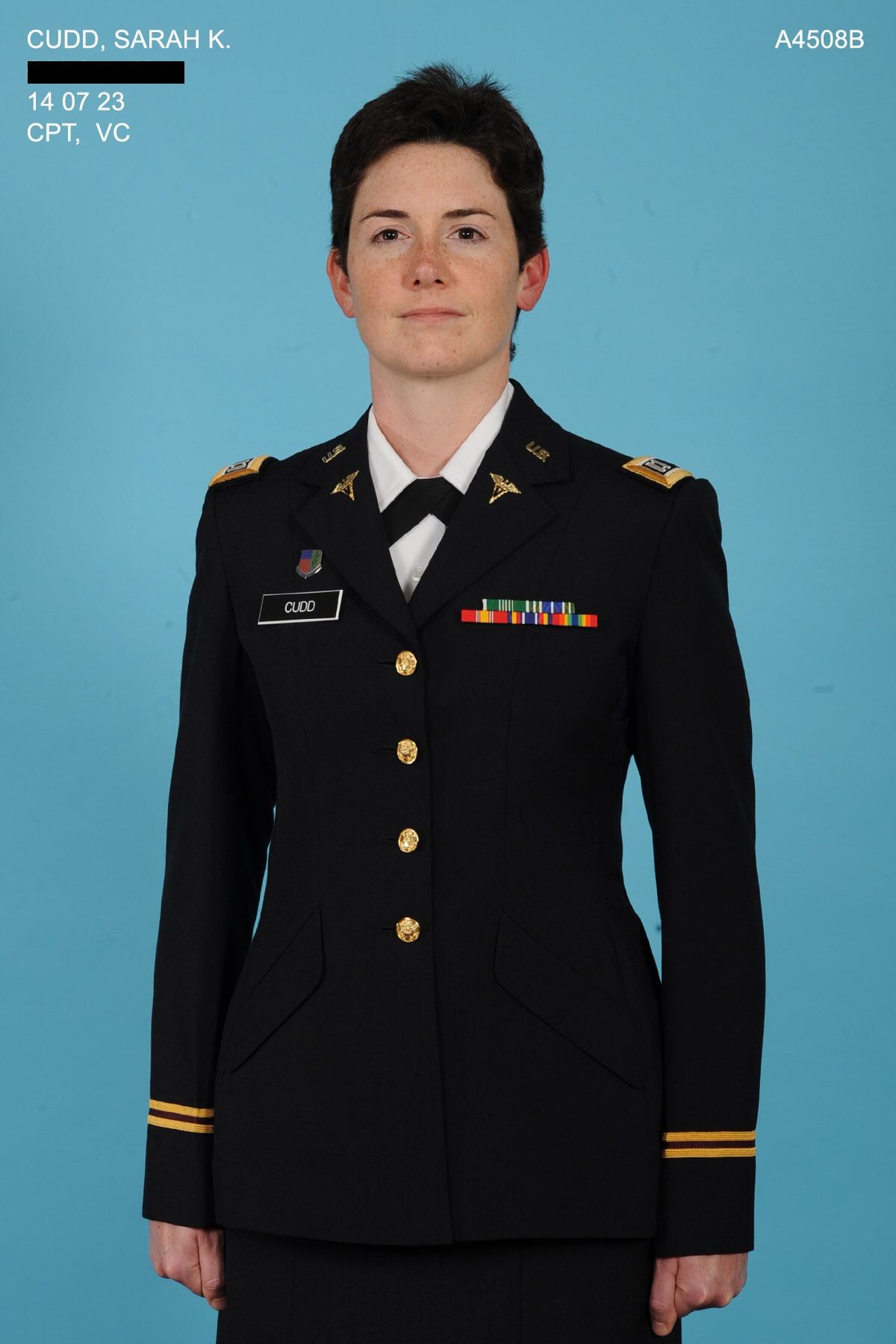As fellow soldiers rallied to her side, cheering the army veterinarian through the final stretch of the 12-mile march, U.S. Army Capt. Sarah Cudd could only focus on steadying her feet.
Twice her legs buckled under the 35-pound rucksack strapped to her back, forcing her hands and knees into the dirt.
"You've got this. Let's go. Come on," they shouted. "Don't give up."
Twice, she righted herself, back hunched, and crossed the finish line on April 27. It was the final test to earn the Army's Expert Field Medical Badge, a rigorous feat for military medical personnel that tests combat care and military survival skills.
Those labored steps at Fort Dix, N.J., recorded by fellow soldier Lloyd Mason and posted to his Facebook page the following day, have since been seen across the world. The initial video has been watched more than 1.25 million times and shared at least 22,000 times as of Wednesday afternoon.
The national and international attention is surprising, Cudd said, and if she's being frank, feels undeserved.
"When I watch the video, I see myself so close to failure," Cudd said, adding there were other fellow soldiers who crossed the finish line that day.
"Me, I was just dragging myself over," she said.

U.S. Army Capt. Sarah Cudd, of the Fort Knox District of the Public Health Command, recently earned her Expert Field Medical Badge, which is known as one of the most difficult and prestigious Army skill badges to earn. A video of her struggling — and persevering — through the final steps of her testing has drawn national and international attention.
Photo Credit: U.S. Army Public Health Command
But Cudd, 29, said she is happy she pushed through and proud of the work she put in to pass the testing. She was one of 46 soldiers who attained the badge, out of more than 230 who attempted.
"It's so wonderful that other people look at it and see inspiration and success," she said.
About 15 to 20 percent of those who attempt to earn the badge succeed in each competition, according to an Army news release, "making the EFMB one the most coveted honors in Army medicine."
The Texas native and five-year Army veteran serves under the Army's Public Health Command District at Fort Knox. She is currently assigned to the Wright-Patterson Air Force Base near Dayton, Ohio, where she runs the Veterinary Treatment Facility.
There, she cares for working Army dogs, as well as the pets of past and present soldiers. She also inspects the food that soldiers purchase on the Air Force base.
The rigor of the test and the chance to expand her medical skills drew Cudd to seek the badge.
"Every good soldier loves a challenge," she said. "From a veterinarian's perspective, I know how to take care of animals, of course, but what better honor to take care of soldiers in the field?"
To help prepare for the testing, Cudd took four training classes at Fort Knox. There, she learned about land navigation and how to use, assemble and disassemble military radios and certain rifles.
In the weeks leading up to the test, she strapped on a 35-pound rucksack and hit bike trails near her home.
"By the time I got there, believe it or not, I had done about 12 miles three times," she said. "When you're already tired and you've already been at the field for 10 days and you're a little bit dehydrated, it makes a difference."
Developing that muscle memory helped ease her into the testing, she said.
The 10-day test was split into two parts: training on performing medical care while under enemy fire in the first half and graded testing on those skills in the second.
Each night, candidate soldiers were able to review what they learned that day in "study hall," Cudd said, practicing and relearning skills that included transporting the wounded, treating battle wounds, operating military radios and coping with chemical and biological contamination.
And while she was working on human soldiers, and not Army animals, she said the skills she learned will make her both a better veterinarian and soldier.
"When you challenge yourself outside of your normal wheelhouse, it's a little uncomfortable to start," Cudd said. "But when you get to the end, regardless whether you succeed or fail, they help you become stronger as a person."





